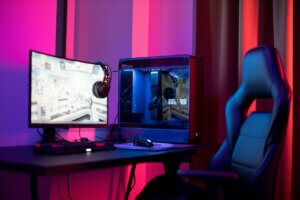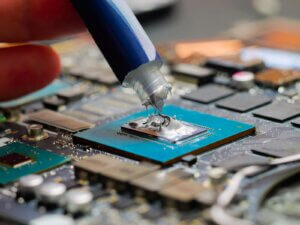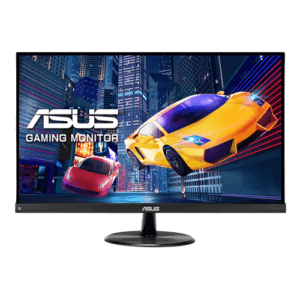If you’ve been around the gaming scene for any time, you know that gaming PCs are monstrous machines. If you haven’t had the chance to utilize a gaming laptop/pc, take our word for it – they’re heavy, to say the least. But how much does a gaming PC weigh?
There’s a visible and frequently enormous gap between the weight of a regular office work laptop/PC and its gaming counterpart. A PC’s actual weight depends on several factors, though.
Average gaming PC weight
While playing on a personal computer is a widely enjoyed pastime, many gamers may be surprised by how bulky a dedicated gaming PC can be.
A typical gaming computer weighs between 20 and 40 pounds (9.07-18.14 kg). The computer’s total mass can shift anywhere from a few pounds to several, depending on the model, the configuration, and the materials used.
This range, however, is still within the norm for most personal computers. However, there are bulkier personal computers available (like those built for 4K gaming).
Why are gaming PCs heavier than standard ones?
To begin, a widespread misconception is that any standard desktop or laptop computer may serve as a suitable substitute for a dedicated gaming PC.
There is a common misunderstanding about that. The main reason why we have desktop gaming PCs huge is that large computer components are less expensive to create than small components such as Laptops.
Desktop gaming PCs usually have more cooling solutions than a battery-based laptop would ever have, and this is why they may outspend the laptops.
Due to the increased demands of modern games and extended play sessions, gaming PCs are now outfitted with a special cooling system.
The bulkiness of a desktop gaming PC is overstated when you think about how its individual parts improve gameplay. Instead, the cost is the primary and possibly single drawback of gaming PCs.
Building a gaming PC from individual parts is cheaper than purchasing a pre-built system.
The Central Processing Unit (CPU), Motherboard (MB), RAM, System unit (SPU), Power Supply (PSU), Hard Disk Drive (HDD) or Solid-State Drive (SSD), and Video Card are all necessary components for a fully functional gaming PC.
A gaming PC’s total mass is determined by a number of factors. Not all of them are equally decisive, but we’ll cover the bases here.
#1. Machine Classification
A big component that adds to the overall weight of a gaming machine is whether it’s low, mid, or high-end. It stands to reason that entry-level machines would be the lightest and that high-end machines would be the heaviest.
This is because the former makes do with cheaper components, making them smaller, lighter, and otherwise inferior.
On the other hand, are heavier since they contain premium components and extras (such as LED lighting) rather than just the standard fare. A more powerful computer would be heavier and costlier than a more basic model.
#2. Casing
The case adds a substantial amount of weight to a gaming PC. One of the biggest parts of a gaming setup is the cases for the games themselves. Some soundproof containers, especially those constructed with dampening materials, can be somewhat cumbersome to transport.
A gaming machine’s chassis is often rather sizable because it must provide enough protection for several internal components.
In addition, game cases are typically elaborate, with features like illuminated glass and specific dimensions and designs. Due to their size and functionality, these may significantly increase your machine’s weight.
#3. GPUs, or Graphics Processing Units
As technology progresses, GPUs grow in size and, consequently, in weight. Since graphics processing units (GPUs) are typically utilized in gaming PCs, these further increase the tally.
Moreover, some gaming PCs use more than one graphics processing unit. No gaming rig can be complete without a graphics processing unit (the GPU). The same can be said about laptops designed for playing video games.
The GPU increases a laptop’s size and weight beyond that of a regular computer.
Presently, a personal computer GPU weighs about 2-3 pounds and a CPU weighs on average 2.1 ounces (59.53 g). This means that the CPU may be made smaller and more energy efficient, as well as being one of the lightest components of a computer.
#4. The Cooling Unit
Video game computers often make extensive use of heavy-duty components and run vast processes in the background, both of which emit a great deal of heat. Large heat sinks and water cooling systems are required to account for the generated heat and maintain a cool environment for the systems.
These help prevent a gaming PC from overheating, making them an essential component. There are some liquid cooling components that are quite bulky and can significantly increase the PC’s overall weight.
A liquid cooling component typically weighs around 5 pounds. Multiple fans, cables, and liquid cooling would make up a heavy-duty cooling system. Because of these additions, your computer will become noticeably heavier in weight.
#5. Motherboard and its Accompanying Parts
The motherboard, RAM, hard drive, solid-state drive, and any additional hardware can all add extra weight to your computer. About 2 pounds is the typical weight of a motherboard (0.9 kg).
Though that may not seem like much, it actually weighs quite a bit more than the rest of the components of a typical PC. While seemingly insignificant, gaming computers typically feature numerous RAM sticks and a variety of hard drives or solid-state drives.
A typical hard disc weighs about 1.6 pounds (0.73 kg). While it might not seem like much, when you start stacking many hard drives, the weight quickly piles up. A hard drive’s dimensions and weight will change based on its model and manufacturer. With everything added up, you can make up for more than 5 extra pounds of weight!
Conclusion – How much does a gaming PC weigh?
The goal of this article was to answer the question, “How much does a gaming PC weigh?” so that you may design a gaming rig that fits your needs and budget.
To sum up, consider the machine’s size and weight carefully before making a purchase of a gaming PC. This not only influences how much space your new computer will require on your desk but also how easily you may relocate it.
A normal desktop computer is substantially lighter than a gaming PC. These computers typically demand a lot more computing power than regular computers, and as a result, they consume more electricity.
In order to accommodate this, these machines require and make use of robust components.
For more information on the weight of gaming PCs, check out this Reddit thread.
Author
-
Gaming For PC (or GFPC for short) is made up of a small team of gamers, content creators, editors, and web design experts.
View all posts












